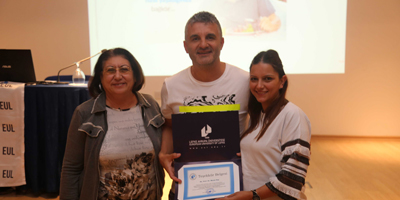“Food Additives and Risk Communication” titled seminar was held at EUL

European University of Lefke (EUL) Faculty of Health Sciences Department of Nutrition and Dietetics organized a seminar titled “Food Additives and Risk Communication”. Academician of Gazi University Faculty of Pharmacy Department of Toxicology Prof. Dr. Bensu Karahalil and Academician of Acıbadem University Faculty of Health Sciences Prof. Dr. Murat Baş attended the conference as speakers.
Baş: In today’s global world, food crises know no national borders
In his presentation, Baş said that “Rapid changes in science and technology, changes in legislation, current socio-economic and socio-demographic realities have a significant impact on foods. One country’s food can be consumed in another country. Nowadays, there are great amount of nourishments that can be easily transported to every country from all corners of the world and can be selected” and underlined that sometimes food with different food quality standards can be found everywhere and food safety knows no limits.
Baş: Usage of chemicals is increasing every year
Baş also said that “Food additives are used in foods due to their various functions. Such as maintaining and improving the nutritional value of food, preserving product quality by preserving sensory properties (taste, odour, colour, texture), preserving product quality by protecting against microorganism growth and oxidation. Food additives are also classified according to their function (colorants, preservatives, antioxidants, emulsifiers and stabilizers, acid-base providers and sweeteners, fragrances and broad purposes). In order to maintain a more comfortable, healthy and quality life, the indispensable properties of chemicals are being utilized while the use of chemicals is increasing every year” and stated that with chemical management systems, chemicals are tried to be utilized in all areas by managing potential risks and minimizing possible risks.
Karahalil: The most important health concern that comes to mind when it comes to chemicals and health concerns is cancer
Karahalil said that “The first condition for knowing and managing the risks of chemical risks is to know the dose of the chemical in the organism. As analysis techniques develope, we are exposed to thousands of chemicals every day, causing chemophobia, which is an irrational attitude in some people. According to chemophobia, all chemicals are harmful, all natural substances are thought to be good and healthy. Hundreds of chemicals in the natural composition of foods that cause high doses of cancer in experimental animals are formed as part of a natural process. These are toxic substances that they create to protect themselves from the destruction of other living things during evolution. One of the most important health concerns that come to mind when it comes to chemicals and health concerns is cancer” and added that the classification of the chemicals according to their carcinogenic effects is carried out by the International Agency for Research on Cancer, affiliated to the World Health Organization.
It is not possible to find a zero-chemical nutriment
In her presentation, Karahalil gave examples from the activities of international organizations responsible for food safety and stated that a food may cause health problems if is not included in the JECFA-A List or the FDA-GRAS (Generally Recognize as safe) list, if the additive contains some contaminants, is produced without complying with legal restrictions without a production permit, is used above the specified limits and the Acceptable Daily Purchase (ADI) value is not taken into account and if the label contains no warning information for risk groups. Karahalil went on to say that “The use of food additives that are considered toxic and carcinogenic to human health is prohibited. It is impossible to find a food that carries zero chemical pollution. Therefore, these health-damaging impurities in food must be brought within the limits of risk acceptable risk. This is only possible when the reliability of the toxicity data is accurately reflected in the legal regulations and the chemicals are managed with a risk management methodology” and stated the process of this methodology as ; risk assessment, risk management and risk communication.
At the end of the seminar, The Head of the Department of Nutrition and Dietetics Prof. Dr. Vahide Yağmur and the Academician of Department of Nutrition and Dietetics Assist. Prof. Dr. Nazal Bardak Perçinci presented certificate of participations to the participants.
